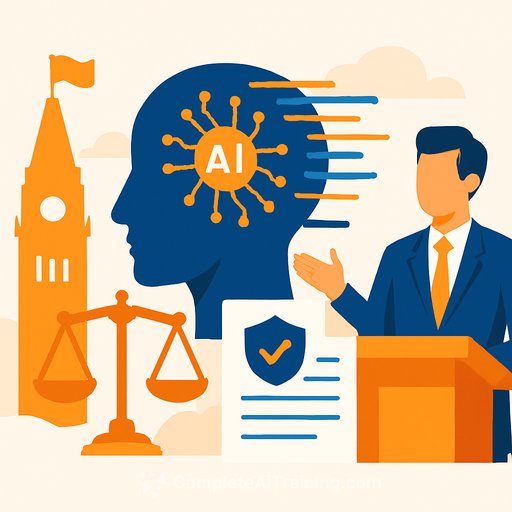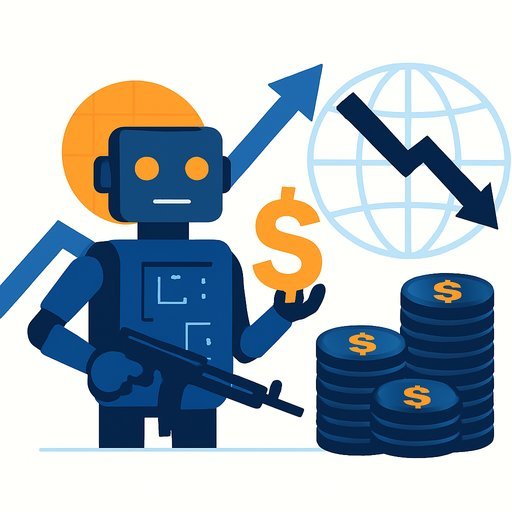Ottawa to table a refreshed AI strategy and data protection bill by year-end: What executives need to know
Canada is assembling a task force to guide its next steps on artificial intelligence and will deliver a refreshed national AI strategy later this year. Artificial Intelligence Minister Evan Solomon said the update is coming "almost two years ahead of schedule" and emphasized urgency: "We need to update and move quickly."
The plan pairs strategy with law. Ottawa will also advance privacy reforms to modernize a 25-year-old framework and set clear standards for how data is used in AI systems.
Task force mandate and timeline
The government is forming a task force of roughly 20 leaders from industry, academia, and civil society. Membership will be announced later this week.
Members are asked to consult their networks, propose bold, practical ideas, and report back in November. The scope covers research, adoption, commercialization, investment, infrastructure, skills, and safety and security. Public input will be sought.
Digital sovereignty and infrastructure
Solomon called digital sovereignty "the most pressing policy and democratic issue of our time." He argued Canada needs a "digital economy that someone else can't decide to turn off."
He likened AI infrastructure decisions to the nation-building choices behind railways and highways. Expect attention on trusted AI in the public sector and investment in Canadian-built systems; Solomon appeared on a panel with Toronto-based Cohere after the announcement.
Quantum initiative on deck
Solomon signaled a major quantum initiative in October focused on keeping talent and intellectual property in Canada. "The goal here is not to be the farm team for someone else's economy. We're not growing companies only to have someone buy it up and move," he said.
Privacy reforms and data standards
Ottawa will advance privacy law reforms to address AI risks, including deepfakes and child safety, and to give innovators clarity on data use. Solomon underscored that sensitive data should be subject to Canadian law, noting public concern across health, financial, and personal information.
The refreshed strategy will build on Canada's existing approach, which was updated in 2022 and focuses on commercialization, standards, talent, and research.
What this means for executives
- Expect stricter requirements around data use, provenance, and model safety. Prepare for clearer rules on testing, documentation, and incident response.
- Plan for data residency and sovereignty expectations in high-sensitivity workflows (health, finance, identity).
- Anticipate stronger incentives for Canadian-built AI infrastructure and public sector partnerships.
- Standards will matter more. Build to recognized benchmarks for security, privacy, and model risk.
- Trust is a strategic asset. Deploy content authenticity, deepfake detection, and transparent user communications.
- Talent is a constraint. Budget for AI skills, quantum-adjacent capabilities, and safety engineering.
Immediate actions to stay ahead
- Appoint an executive AI and data governance lead with authority across security, legal, and engineering.
- Map sensitive data flows and retention. Minimize, encrypt, and log access by default.
- Audit current AI use cases for privacy risk, model bias, security controls, and vendor dependencies.
- Update vendor contracts for data localization, IP ownership, audit rights, and incident notification.
- Implement deepfake countermeasures: media provenance, detection tooling, and employee/customer training.
- Upskill leadership teams to make informed build/buy decisions and set guardrails. Explore role-based programs at Complete AI Training.
Key dates and signals
- This week: Task force membership to be announced.
- October: Quantum initiative details.
- November: Task force delivers recommendations.
- Year-end: Refreshed AI strategy and privacy reforms tabled.
Context and references
Canada was the first country to launch a national AI strategy and updated it in 2022. For background, see the Pan-Canadian AI Strategy overview by CIFAR and federal privacy law context.
Bottom line: Ottawa is accelerating on AI policy, infrastructure, and data rights. Treat this as a near-term compliance update and a long-term capacity build for your organization.
Your membership also unlocks:






